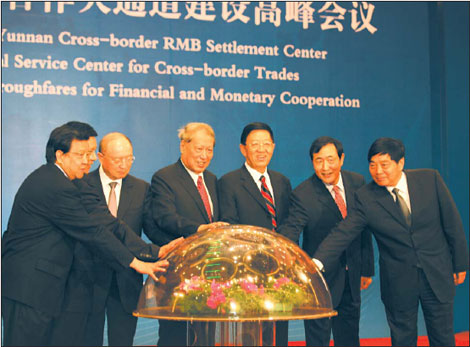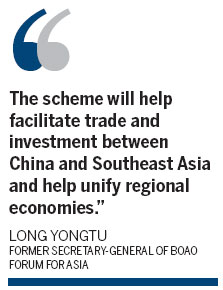News
Bankers at Dianchi forum note nuances settling trade in RMB
By Chen Jialu (China Daily)
Updated: 2010-07-29 07:45
 |
Large Medium Small |
 |
|
Former National People's Congress Vice-Chairman Cheng Siwei (center), Yunnan Party chief Bai Enpei (third right), Yunnan Governor Qin Guangrong (second left) and Kunming Party chief Qiu He (first right) at the ceremony to mark Kunming's currency settlement center. Wu Jiachun / China Daily |
The move will advance the city's efforts to become a financial hub for southwest China and the center of renminbi-dominated trade settlement between China and Southeast Asia, Liu Guangxi, vice-mayor of Kunming, said at the opening of the Dianchi forum in the capital of Yunnan province on Tuesday.
Liu's comments were among those from a range of high-powered bankers and officials on hand for the forum in Kunming.
Qiu He, the city's Party chief, said that Yunnan has a competitive advantage in serving as the settlement hub due to the region's cross-border trade with neighboring countries and strong demands from traders to use the Chinese currency in transactions.
"The scheme will help facilitate trade and investment between China and Southeast Asia and help unify (regional) economies," said Long Yongtu, former secretary-general of Boao Forum for Asia.
The scheme will help reduce reliance on the US dollar, said Yi Cheng, IMF's chief representative to China.
In June the People's Bank of China - the country's central bank - announced that pilot renminbi cross-border trade settlement operations would be permitted in 20 provinces, autonomous regions and municipalities on the mainland and everywhere overseas.

"Before, traders doing business between China and Southeast Asia had to convert their currencies to US dollars," said Li Jiming, a commerce official with the Yunnan provincial government.
As a keynote speaker at the Kunming forum, Bank of China President Li Lihui said the bank will fully support its branch in Yunnan to extend its renminbi settlement business.
Li said overseas subsidiaries of commercial banks should be encouraged to receive renminbi deposits and be allowed to issue bonds denominated in the Chinese currency.
Mushtaq Khan, chief economic adviser with the State Bank of Pakistan, said the plan to liberalize China's capital account should be implemented in steps.
"China appears committed to capital account convertibility," said Mushtaq. "Hong Kong is at the forefront of the off-shore RMB market, Singapore is close behind and other ASEAN countries are in the pipeline."
The Pakistani banker noted "the challenge is how to liberalize capital flows without being inundated by hot money".
"Given the size of the Chinese economy and its growth potential, this is not an easy task - and it would be impossible to satisfy all stakeholders," said Mushtaq.
Frank Gong, vice-chairman of the China Investment Banking division at JP Morgan, said the popularity of the pilot settlement program is limited by the availability of attractive investments using China's currency.
Kwan Yin Ping, chief executive of Hang Seng Bank (China), noted "the scheme is in early days yet and we expect demand for settlement in renminbi to continue to grow as companies assess the opportunities".
Renminbi trading is likely to be volatile, so the pilot project in Kunming will allow policymakers on the mainland to gain experience before full-scale convertibility, said Lawrence Lam, chairman of the Greater China business at the Royal Bank of Scotland.
Hong Kong accounted for 75 percent of the total 70.6 billion yuan in renminbi settlement in the first half of this year, Lin Guangming, general manager of Bank of China (Hong Kong), said on the sidelines of the Dianchi forum.
"But only a very tiny share - about 0.3 to 0.4 percent of China's total trade - has been settled in renminbi" since clearing in the Chinese currency began a full year ago, Lin said.
"The future is bright, but the path is hard," said Long Yongtu.
(China Daily 07/29/2010 page18)